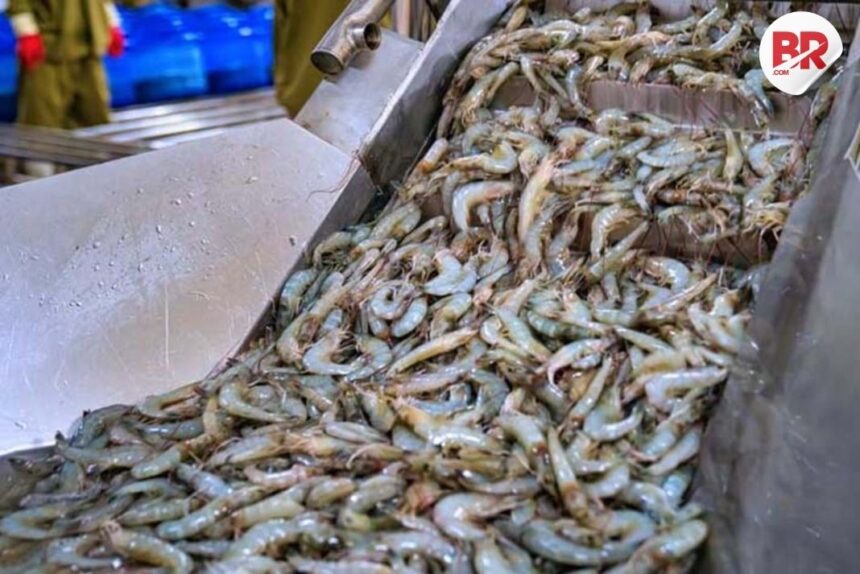Trump’s Tariffs Hit Indian Shrimp Industry Hard
In July, former President Trump announced a plan that could impose a 26% tariff on Indian shrimp. The proposed tariffs threaten India’s $7 billion seafood export market, which plays a crucial role in supplying shrimp to major U.S. supermarkets like Walmart and Kroger. This tariff, if passed, could have serious consequences for Indian shrimp farmers and exporters, especially those in Andhra Pradesh, who account for 92% of India’s shrimp exports.
Shrimp Farmers in Andhra Pradesh Struggling
Andhra Pradesh is home to the majority of India’s shrimp production. Farmers there are already facing tough conditions, with high feed costs and land expenses making it difficult to turn a profit.
As a result, many are feeling the weight of the proposed tariff. “Sales are dropping, and prices are being slashed,” said one farmer. This uncertainty is causing some farmers to regret recent investments in their businesses. Many had hoped for growth, but now they fear the worst if the tariff is enforced.
The proposed tariff means that Indian shrimp could become significantly more expensive for American buyers. If the price hikes happen, exporters worry they will lose their dominant position in the U.S. market. It could also disrupt their strong presence in other global markets, such as China and the European Union.
Also Read: Asian Stocks Surge, But Trump’s Tech Tariff Pause Could Just Be a Temporary Fix
Ecuador’s Competitive Advantage
Ecuador, a rising competitor in the shrimp market, has a distinct advantage over India. With a lower tariff of just 10% and closer proximity to the U.S., Ecuadorian shrimp can reach American supermarkets at a more affordable price.
Ecuador’s shrimp production capacity is growing, with forecasts predicting a $1.55 billion output in 2024. However, it is still not enough to replace India’s vast shrimp export capacity.
Indian exporters fear that Ecuador’s advantage could push them out of key markets. With tariffs threatening India’s exports, Ecuador could seize market share, especially in Europe and China. But, while Ecuador’s shrimp industry is on the rise, it will take time to reach the scale of India’s massive operations.
Logistical Challenges Add to the Strain
One of the major hurdles for Indian shrimp exporters is the logistics involved in shipping their products to the U.S. Indian shrimp take approximately 40 days to reach American shores.
In comparison, Ecuador’s shrimp can make it to the U.S. in a shorter time frame. With thin profit margins of just 3-4%, Indian exporters are at risk of losing money if they have to renegotiate prices due to the tariff. One exporter put it bluntly: “If the 26% tariff goes through, it’s game over.”
Also Read: Xi Jinping Dares to Say: No Winners in the Trade War. But Who’s Really Losing?
The Response from Indian Exporters
Indian exporters and state officials are not sitting idly by. They are actively exploring alternative markets, including China and the European Union, in hopes of offsetting the losses from U.S. sales. In addition, they are lobbying for exemptions to the tariffs in a bid to preserve their position in the U.S. market.
Walmart, one of the largest buyers of Indian shrimp, has reaffirmed its commitment to sourcing from India. However, the retail giant has also acknowledged that the proposed tariff would put significant pressure on pricing. As a result, both exporters and buyers are trying to find a solution to keep the market stable.
Conclusion
Trump’s tariffs could severely affect India’s shrimp industry, but there is still hope. With proactive measures, like diversifying into new markets and lobbying for tariff exemptions, Indian exporters are fighting back. However, with competition from Ecuador growing and logistical hurdles remaining, the road ahead looks uncertain.
Indian farmers and exporters must continue to adapt if they want to maintain their position in the global seafood market. The situation is delicate, and time will tell if the tariffs will be implemented or if a solution can be found.
Also Read: Trump Says Chinese Chips to Face National Security Probe; More Tariffs Expected Soon




